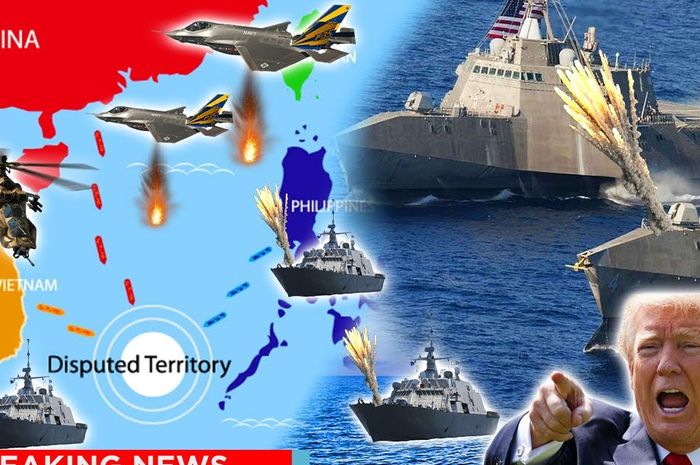Sosok.ID – A week before the US presidential election in November, the President’s two top national security aides Donald Trump will visit India.
Minister of Foreign Affairs United States of America (USA) Mike Pompeo and Secretary of Defense Mark Esper are coming to New Delhi on Tuesday (26/10/2020).
The meeting will largely focus on countering global influence, according to the Associated Press China that is developing.
During the fierce battle between the President Donald Trump and former Vice President Joe Biden ends, this week’s talk on New Delhi aims to strengthen the anti-China.
Also Read: Find a Team? Visits to India, Sri Lanka, Maldives, and Indonesia, US Discusses China’s Issues
Mike Pompeo and Mark Esper will meet with their Indian counterparts for strategic and security talks, and continue visits to Sri Lanka, the Maldives and Indonesia.
The tension between Washington and Beijing has risen as Trump seeks to portray Biden as a weakling with China.
Trump has toyed with Indian Prime Minister Narendra Modi in his re-election bid, but may have reversed the case with indirect comments on climate change during his Thursday debate with Biden.
“Look at China, how dirty it is. Look at Russia. Look at India, it’s dirty. The air is dirty, “Trump said, defending his decision to withdraw from the Paris Climate Accord.
Also Read: Demonstrating Combat Capability to China, India Holds Large-Scale Military Exercises
How India responds to the anti-China Trump spread through Pompeo and and Esper is unclear.
However, despite his election considerations, this is a critical time in US-India relations as China looms large over what Washington calls the Indo-Pacific region.
The rising border tensions between New Delhi and Beijing have only added to China-America hostility.
The conflict between the two major powers was previously sparked by disputes over the coronavirus, trade, technology, Taiwan, Tibet, Hong Kong, human rights and disputes between China and its smaller neighbors in the South China Sea.
Those competing maritime and territorial claims will stand out at Pompeo’s final stop in Indonesia.
Meanwhile, India wants to get out of its shell of internal problems, including unrest in the Himalayan region of Kashmir, and wants to join a group of like-minded countries facing threats from China and Pakistan.
The US-India meeting on Tuesday comes amid recent turmoil in military tensions between India and China.
Trump has offered to help defuse tensions but has not received any indication of interest from either side.
India and China are known to have fought for a month in the Himalayan border region at the height of the Cuban Missile Crisis in the fall of 1962.
Many fear a similar confrontation before this winter arrives.
Pompeo has made no secret of the Trump administration’s desire to isolate China.
Asked about his trip, Pompeo said last week: “I am confident that my meeting will also include a discussion on how free countries can work together to thwart the threat posed by the Chinese Communist Party.”
Ahead of Pompeo and Esper’s visit, Deputy Foreign Minister Stephen Biegun visited New Delhi last week and called China “an elephant in the room”.
He stressed that Washington wanted to advance India’s interests in the region, build a free and open Indo-Pacific, and counter the risks posed by China’s high-tech telecommunications networks, which the US considers the center of China’s predatory economic activity.
“We will take every opportunity to really advocate for a strong digital economy and partnerships in the countries we go to and seek support from the Net Network, which we think is beneficial for every country,” said Dean Thompson, top US diplomat for South Asia. .
Since Trump became president, the US and India have continued to improve their military ties.
When Trump visited India in February, the two sides struck a defense deal worth more than $ 3 billion.
Bilateral defense trade has risen from near zero in 2008 to $ 15 billion in 2019.
But India is still wary of getting involved in the battle between the world’s two largest economies.
G. Parthasarthy, a retired Indian diplomat, said India was not interested in being a frontline state against China.
“This is a step to balance China’s growing power in this area. The India-China border problem will not go away with increasing Chinese claims, ”he said.
Talks on New Delhi on Tuesday following Pompeo’s meeting earlier this month in Tokyo with his counterparts from India, Japan and Australia, which together make up the four Indo-Pacific nations known as the “Quad.”
The quad is seen as a counterweight to China, which critics say is flexing its military muscle across the region.
Pompeo will return to Washington via Sri Lanka, Maldives and Indonesia in which he plans to pressure every country to push back on assertiveness China.
He is also expected to raise human rights issues at each stop.
–
south china sea


